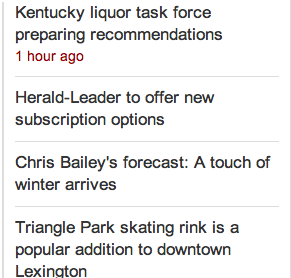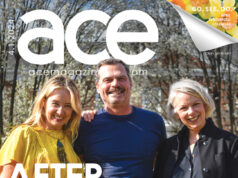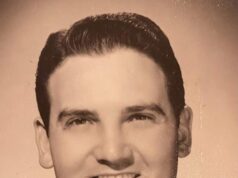BY KAKIE URCH
Mark Twain always said….OK, all together now…. “When I die, I want to be in Kentucky, because everything there always 

Well, it has happened. Our Pulitzer-Prize winning local newspaper, the McClatchy-owned Lexington Herald-Leader, has announced that (Mark Twain will die and) the paywall will be erected on www.kentucky.com on Dec. 4.
In Internet time, yes, it is 20 years later. The paywall, long expected, has come to pass.
And the paper buried the lede. As one of my former students pointed out, the story headlined “Herald-Leader to offer new subscription options” didn’t mention a paywall until the sixth paragraph.
In one of the preceding paragraphs, the newspaper did point out that more than 300 news organizations, including some in Kentucky (Courier-Journal and Kentucky Enquirer, the other two largest newspapers in the state) are now charging for access to online news content.
OK, they buried the lede. They appended a very dense but thorough Frequently Asked Questions link about how it will work, which we have read and will summarize for you below. (We, the ninja of the unique and the PV and the metric). But, on the face of it, we’ll argue, it is worth it.
One of the few non-wasted words that the Herald-Leader story puts out there in the six paragraphs preceding the news is that its “professional” journalists do this work.
We’ll develop this story further, from the industry point of view as the day goes on. But, in essence, it means a $.60 a week additional charge for print subscribers ($31.20 a year), or $9.99 a month for new digital subscribers ($119.88 a year) to pay for more than 15 page views a month on professionally reported and vetted content or more than 60 page views a month on your iPhone or Android device, in a subscription that is usable across five separate devices.
The paper says that it will limit access to “story-level pages, photo galleries, commenting and opinions and breaking news,” what that means is “when, for example, you click on a headline on the homepage and select a story, that page counts towards a limit of 15* free pages per 30-day period. Once you reach your 15*-page limit, if you don’t have a digital subscription, you’ll be required to subscribe or wait until the next 30-day period to access them,”
(iPhone and Android eyeballs get 60 free views before the limit kicks in, which may say something about the resale value of iPhone and Android eyeballs).
This is not to say that all the new media that has sprung up on the Internet to cover local issues and sports is not good or professional or perfectly justified in exercising the First Amendment right to expression and Open Records and Open Meetings. This is not to say that I didn’t find out about this news through the newsfeed of a different source: the Facebook timeline of a surf-rocking, LexMark-working, marching band geek, not www.kentucky.com This is not to say that we couldn’t come up with several new niche products to serve all the people who are not fully served by the flagship mainstream newspaper of our community. This is not to say that you are not right for hating or loving whichever sports reporters, editorial columnists, cartoonists or arts reviewers that you love or hate.
I am saying it is worth less than the average month of cable access to “Real Housewives of Everywhere But Here” to have a YEAR of professional journalism staff dedicated to providing an omnibus of Big Blue news, election coverage, city council coverage, neighborhood coverage, photo galleries of marching band competitions, agate for high school sports, the record of our passing from this community, local arts and business news, severe weather coverage, statehouse coverage and education coverage.
For ill or not, the Herald-Leader has spoken truth to power for our community for decades, puts reporters on planes to cover “our team” in person, brings investigative reporting to bear on misuse of public funds, public trust and public responsibility and still sends professional reporters out to cover our “Great Teachers Awards” assemblies and photographers to shoot our “Cute Dogs on Parade” events.
In coverage of the arts and music, the team that includes Rich Copley and Walter Tunis has few peers for a newsmarket our size. From opera to theatre to Hollywood to bluegrass and Boomslang, they bring it, with expertise and context. John Clay IV is a sports multimedia model for any other college sports reporter to learn from, Tweet by Tweet, video by video, column by column, live blog by live blog. Tom Eblen’s opinion and observations are beloved and respected. Mary Jean Wall and Janet Patton’s coverage of the horse industry is without equal in the last 20 years.
Maria Henson’s Pulitzer Prize-winning editorial series in the 1980s changed the state law to better protect victims of domestic abuse. The “Cheating Our Children” series exposed wrongs that resulted in our entire system of education being declared unconstitutional and rebuilt through the Kentucky Education Reform Act. The paper in Mary Todd Lincoln’s hometown had the humility, in the early aughts, to take a full-page, front-page correction for “neglecting to cover the Civil Rights Movement.”
The paper, because a one-time editor decided to take up jogging, started the Bluegrass 10,000.
Its hard look at the University of Kentucky basketball program in the 1980s, yes, won the Pulitzer Prize and yes, made a lot of people mad. But the compliance measures put in place after that coverage laid the groundwork for a more transparent and open program that ensures that sunlight reaches the open records and open information.
And the paper (who am I kidding, I buy single copy on one day only: Derby Day, for the great physical, follow-along-with-the-TV, foldable, list of contenders), er the Web site, keeps pushing for that openness, that sunlight, that information, that cute dog every day, like it’s their job.
Because it is. And people should get paid for their job.
Kakie Urch is an assistant professor of multimedia in the University of Kentucky School of Journalism and Telecommunications. She was a Herald-Leader intern and employee in the 1980s and is a former editor of the Kentucky Enquirer and former assistant managing editor of the Kentucky Post and the Palm Springs Desert Sun. She has worked for Knight-Ridder, Scripps-Howard and Gannett, all major mainstream corporate media organizations. She most recently was a professor in residence with the “Caucuses” Web site of the Des Moines Register.








